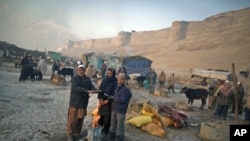A respected London research organization says the Afghan government likely will be able to retain control of the country after foreign troops end their combat role in three years. But the International Institute for Strategic Studies says Western nations will need to provide financial and military support for Afghanistan for much longer.
The 300-page report says the challenges ahead for Afghanistan are huge, and its path will be difficult. But the authors, including Middle East expert Toby Dodge, come away with what they call ‘constrained optimism,’ as long as the West does not abandon Afghanistan when its combat troops leave in 2014.
“The United States and its allies, brought together within NATO and the United Nations, have to keep a quite muscular, omnipresent watching brief on Afghanistan," said Dodge. "Certainly there will be an ‘over the horizon’ watching brief and a presence on the ground in Kabul. But the main commitment will be financial, and I think there is enough of a political consensus to guarantee that over the next decade.”
The report warns the Kabul government may not have full control over the country by 2014. But the authors believe its security forces should be strong enough to assert control where necessary to prevent terrorists from using the country as a base, as they did in the years before the September 11th attacks in 2001.
Some experts believe Afghanistan will need a more robust foreign military presence than Western nations want to provide after 2014, including training, air support, counter-terrorism units and rapid reaction forces. But retired British Brigadier Ben Barry, who wrote the book’s security chapter, said there also may be resistance to a continuing Western military role from the Afghans.
“You could see Afghan nationalism coming into play, and the Afghans becoming increasingly fed up with Western boots on the ground, with civilian casualties and collateral damage, and also a sense that Western boots on the ground are a recruiting sergeant for the Taliban and Jihadists. We have seen this to a certain extent in Iraq,” said Barry.
The IISS report is fairly optimistic about the future role of Afghanistan’s neighbors. It says the relative strength of the Afghan government forces the country’s neighbors to deal with Kabul, rather than their preferred ethnic groups or militias.
The book does, however, express concern about what the authors call the myriad risks in Pakistan.




